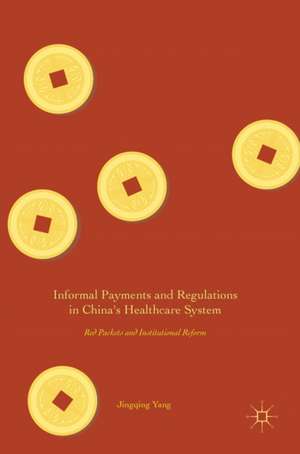Informal Payments and Regulations in China's Healthcare System: Red Packets and Institutional Reform
Autor Jingqing Yangen Limba Engleză Hardback – 15 dec 2016
| Toate formatele și edițiile | Preț | Express |
|---|---|---|
| Paperback (1) | 314.37 lei 38-44 zile | |
| Springer Nature Singapore – 30 apr 2018 | 314.37 lei 38-44 zile | |
| Hardback (1) | 371.10 lei 6-8 săpt. | |
| Springer Nature Singapore – 15 dec 2016 | 371.10 lei 6-8 săpt. |
Preț: 371.10 lei
Preț vechi: 390.63 lei
-5% Nou
Puncte Express: 557
Preț estimativ în valută:
71.02€ • 77.12$ • 59.66£
71.02€ • 77.12$ • 59.66£
Carte tipărită la comandă
Livrare economică 22 aprilie-06 mai
Preluare comenzi: 021 569.72.76
Specificații
ISBN-13: 9789811021091
ISBN-10: 9811021090
Pagini: 311
Ilustrații: XI, 287 p. 2 illus.
Dimensiuni: 148 x 210 x 24 mm
Greutate: 0.48 kg
Ediția:1st ed. 2017
Editura: Springer Nature Singapore
Colecția Palgrave Macmillan
Locul publicării:Singapore, Singapore
ISBN-10: 9811021090
Pagini: 311
Ilustrații: XI, 287 p. 2 illus.
Dimensiuni: 148 x 210 x 24 mm
Greutate: 0.48 kg
Ediția:1st ed. 2017
Editura: Springer Nature Singapore
Colecția Palgrave Macmillan
Locul publicării:Singapore, Singapore
Cuprins
Introduction.- Socialist Medicine and Theories of Informal Payments.- Institutional Changes and the Power of Chinese Medical Professionals.- Health Reform and the Rise of Informal Payments after 1978.- Transactions of Red Packets in the Hospital.- Rein in Red Packets.- Conclusion.
Notă biografică
Dr Jingqing Yang is a Senior Lecturer in China Studies at the University of Technology Sydney, Australia. His research interests cover sociology of medicine, social history of Chinese healthcare system and medical professions, and China’s health reforms.
Textul de pe ultima copertă
This text addresses the key issue of informal payments, or ‘red packets’, in the Chinese Healthcare system. It considers how transactions take place at the clinical level as well as their regulation. Analysing the practice from the perspectives of institutions and power structure, it examines how institutional changes in the pre-reform and reform era have changed the power structure between medical professions, patients and the Party-state, and how these changes have given rise and perpetuate the practice. Drawing from qualitative data from interviews of medical professionals, the author recognises the medical profession as a major player in the health care system and presents their perception of the practice as the taker of ‘red packets’ and their interactions with the patient and the state surrounding the illegal practice in an authoritarian power structure. The books considers the institutional reasons that motivate doctors to take, patients to give, and the government to "tolerate"red packets, arguing that the bureaucratization of the medical profession, society of acquaintances and shortage of quality of medical services jointly create an institutional setting that has given rise to these informal payments. Contributing to a rounded understanding of the problems of healthcare reform in China, this book is a key read for all scholars interested in the issue of informal payments and healthcare politics in transition economies.
Caracteristici
Considers the rise, prevalence and regulation of the issue of informal payments in Chinese healthcare from 1949 to the present day Puts the medical profession at the forefront of the debate on healthcare reform in China Offers a widely relevant contribution to a key debate on healthcare in transition economies

















